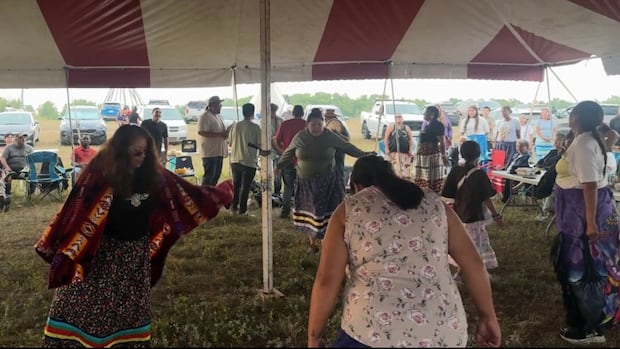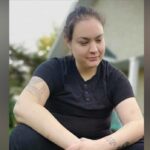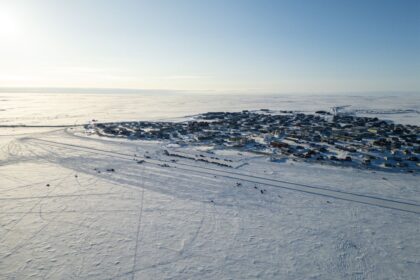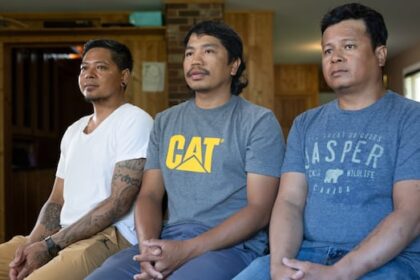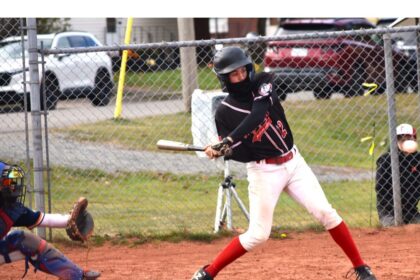IndigenousKahkewistahaw First Nation held a week-long traditional gathering, and invited Ken Saddleback from Maskwacis, Alta., to teach the community once again what the tea dance is and the protocols.Lodge keeper travels from Maskwacis to help revive the practiceLouise BigEagle · CBC News · Posted: Aug 11, 2025 6:57 PM EDT | Last Updated: 3 hours agoMembers of the community and visitors dance any style for the tea dance. (Darla Ponace/CBC)It’s been 80 years since the Cree community of Kahkewistahaw First Nation held a tea dance so this year they decided to include it in their week-long traditional gathering earlier this month. Tea dance leader and lodge (ceremonies) keeper Ken Saddleback, a member of Samson Cree Nation from Maskwacis, Alta., drove almost 1,000 kilometres to the community about 170 kilometres east of Regina, and brought along some of his family, to help teach about the old dance.Saddleback said back in the day they used to call it the drunk dance.”You can act crazy and dance any style. It’s just to make people laugh,” said Saddleback.Saddleback said long ago, a grandmother had a vision that showed her a sickness would come after new people arrived on their lands and millions would be wiped out. By doing the dance, people hoped the sickness would think they were crazy and pass over them, said Saddleback, and in his home community they have two to three tea dances a week, sometimes even every day.Ken Saddleback, a Cree lodge keeper, travels to teach other communities about certain ceremonies like the chicken and tea dance. (Louise BigEagle/CBC)The tea dance, along with other First Nations cultural practices, was outlawed under the Indian Act until 1951. The ban aimed to assimilate First Nations people by banning cultural practices, which eventually led to the loss of cultural knowledge and oral histories.Saddleback said that Indigenous people have been listening to somebody else’s story, talking somebody else’s language and living in somebody else’s culture.”It’s time to come home…come home to our culture, our spirituality, our language,” said Saddleback.Saddleback said he was invited to Kahktewistahew to run the tea dance and also the chicken dance.”I just do them to provide healing so that people can come freely to learn,” said Saddleback.”If I stop, if I don’t do them, then other men, the warriors, won’t know how to do them.”He said the tea dance style they taught at the gathering is what he considers Hobbema-style.Teepee structures stand in the background of a hide being scraped and the outdoor kitchen for the traditional gathering in Kahkewistahaw First Nation. (Louise BigEagle/CBC)Josephine Kaysaywaysemat, the health director for the community, has been working on making language and culture a health priority. That’s why they held a week-long traditional gathering that hosted lodges like the ghost dance, chicken dance, horse dance and the tea dance.She danced under the tent, smiling and moving her arms up and down, happy to have the tea dance back in her community.Kaysaywaysemat said the tea dance is not the only one being revitalized in the community — ceremonies like ghost and horse dance haven’t been done in her community in years.Josephine Kaysaywaysemat was excited for the tea dance to come back into her community and to see how it brings the community together. (Louise BigEagle/CBC)Kaysaywaysemat said many elders may have never seen or been a part of this dance and she is hoping it plants seeds in the community to do it again.”It was a regular occurrence long ago and at a time when prayers were needed,” said Kaysaywaysemat.In her community she said there can be dysfunction but she feels the lodges will give them hope for the future.Kaysaywaysemat said she hopes more members will come out next year and feel what she and others felt all week.”These lodges give people identity and pride and change that negative into a positive; it’s like the more people coming to lodge, the more the families are being helped,” said Kaysaywaysemat.ABOUT THE AUTHORLouise has been a journalist with CBC since September 2022. She is Nakota/Cree from Ocean Man First Nation. She holds a bachelor of fine arts from the University of Regina. Louise can be reached at louise.bigeagle@cbc.ca.
Friday, 6 Feb 2026
Canada – The Illusion
Search
Have an existing account?
Sign In
© 2022 Foxiz News Network. Ruby Design Company. All Rights Reserved.
You May also Like
- More News:
- history
- Standing Bear Network
- John Gonzalez
- ᐊᔭᐦᑊ ayahp — It happened
- Creation
- Beneath the Water
- Olympic gold medal
- Jim Thorpe
- type O blood
- the bringer of life
- Raven
- Wás’agi
- NoiseCat
- 'Sugarcane'
- The rivers still sing
- ᑲᓂᐸᐏᐟ ᒪᐢᑿ
- ᐅᑳᐤ okâw — We remember
- ᐊᓂᓈᐯᐃᐧᐣ aninâpêwin — Truth
- This is what it means to be human.
- Nokoma


